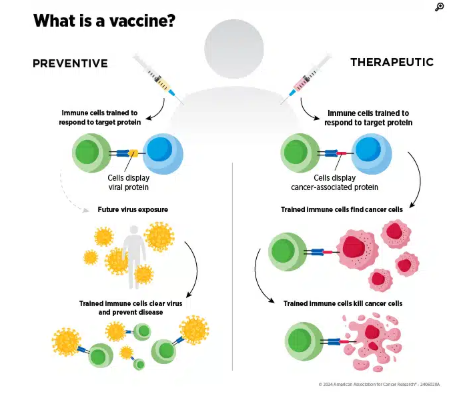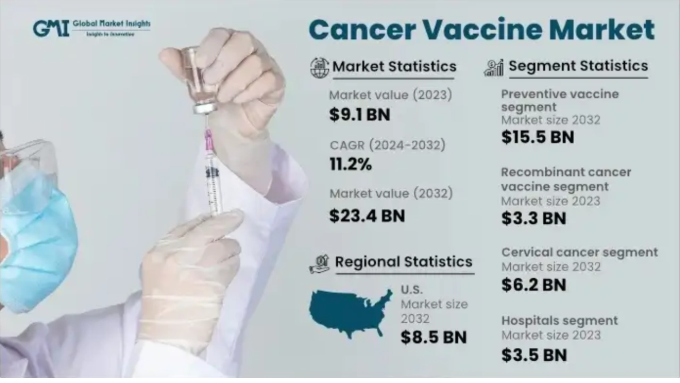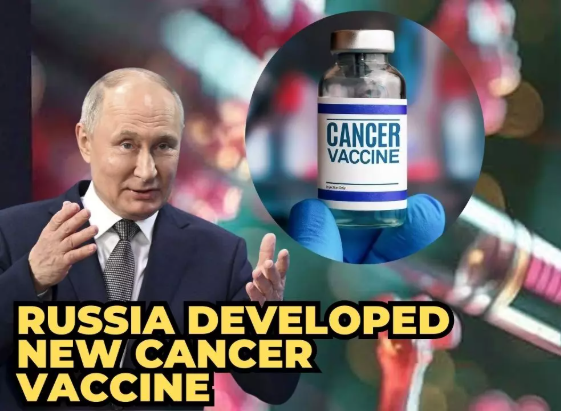“Russia’s Breakthrough Cancer Vaccine: A New Hope for Patients Worldwide”
In a groundbreaking development, Russia has announced a major breakthrough in cancer treatment with the creation of a cancer vaccine. This innovation, which has the potential to reshape the future of cancer care, is being hailed as a significant advancement in medical science. The cancer vaccine, developed using the latest mRNA technology, is poised to offer hope to millions of patients worldwide. The most striking aspect of this vaccine is its promise to be distributed free of charge to patients by 2025, a move that could revolutionize access to cancer treatment.
What is the Cancer Vaccine?

At its core, the cancer vaccine is designed to help the immune system recognize and attack cancer cells. Unlike traditional vaccines that prevent diseases, this vaccine works by stimulating the immune system to target and destroy existing cancerous cells. Developed using mRNA technology, similar to the approach used in COVID-19 vaccines, the cancer vaccine introduces a small fragment of the cancer’s genetic material into the body. This prompts the immune system to produce specific antibodies that can recognize and destroy cancer cells.
What makes this cancer vaccine different from existing therapies is its ability to provide personalized treatment. It targets the unique molecular features of a patient’s cancer, allowing for a more tailored and effective response. This could lead to improved outcomes for cancer patients, especially in cases where conventional treatments like chemotherapy and radiation have limited success.
Russia’s Investment in Cancer Research
Russia’s foray into cancer vaccine development is the result of years of research and innovation by the Russian Ministry of Health and local biotech companies. The vaccine, developed by the Moscow-based research team, is part of a broader effort by Russia to become a leader in global cancer treatment. The development of this vaccine reflects Russia’s commitment to advancing medical science and providing solutions for the growing global burden of cancer.
One of the most promising aspects of this vaccine is its accessibility. Russia has pledged to distribute the cancer vaccine free of charge to patients by 2025. This bold initiative could help bridge the gap between expensive cancer treatments and those who are unable to afford them. In a world where cancer treatment costs can be astronomical, making this vaccine available at no cost represents a significant step toward ensuring equitable access to life-saving therapies.
mRNA Technology: The Future of Cancer Treatment
 The success of mRNA-based vaccines, which played a crucial role in combating the COVID-19 pandemic, has opened new doors for cancer research. mRNA technology has the potential to revolutionize the way we treat not only infectious diseases but also cancer. By harnessing the body’s own immune system to target cancer cells, mRNA vaccines offer a level of precision that traditional treatments lack.
The success of mRNA-based vaccines, which played a crucial role in combating the COVID-19 pandemic, has opened new doors for cancer research. mRNA technology has the potential to revolutionize the way we treat not only infectious diseases but also cancer. By harnessing the body’s own immune system to target cancer cells, mRNA vaccines offer a level of precision that traditional treatments lack.
Russia’s cancer vaccine is one of the first in the world to leverage this cutting-edge technology for cancer treatment. This new approach could overcome some of the limitations of conventional cancer therapies, such as the side effects of chemotherapy or the difficulty of targeting specific cancer cells without damaging healthy tissue. By using mRNA, the vaccine aims to stimulate an immune response that is specific to the cancer type, reducing the risk of harm to healthy cells and improving the overall efficacy of the treatment.
The Global Impact: What Does This Mean for Cancer Patients?

The development of Russia’s cancer vaccine is a significant milestone in the fight against cancer, a disease that claims millions of lives each year. By utilizing mRNA technology, the vaccine offers hope for more targeted and less invasive treatment options. Moreover, the fact that the vaccine will be distributed free of charge adds a layer of optimism, especially for low-income patients who often face financial barriers to treatment.
However, while the promise of the cancer vaccine is exciting, it is important to note that the vaccine is still in the early stages of development. Clinical trials are underway, and it may take several years before the vaccine is available on a global scale. Despite this, the potential impact of this vaccine is immense. If successful, it could change the landscape of cancer treatment and significantly improve survival rates, especially for patients with rare or hard-to-treat cancers.
Challenges and Considerations
Despite the optimism surrounding the cancer vaccine, there are several challenges that must be addressed before it can be widely implemented. One of the key obstacles is the scalability of production. Manufacturing mRNA vaccines at a scale large enough to meet global demand will require significant infrastructure and investment. Additionally, the long-term effectiveness and safety of the vaccine need to be carefully monitored through extensive clinical trials.
Another challenge is ensuring that the vaccine reaches those who need it the most. While Russia’s plan to provide the vaccine free of charge is commendable, ensuring its global distribution and accessibility will require international cooperation and coordination. This may involve partnerships with other countries and global health organizations to facilitate the distribution process.
Conclusion: A New Era in Cancer Treatment

Russia’s development of a cancer vaccine marks the beginning of a new era in cancer treatment. By leveraging mRNA technology, this vaccine offers a promising alternative to traditional cancer therapies. With its ability to provide personalized treatment and its commitment to making the vaccine accessible to all, Russia’s cancer vaccine could be a game changer in the fight against cancer.
While there are still many hurdles to overcome, the development of this vaccine is a beacon of hope for millions of cancer patients worldwide. As the world continues to battle the global cancer epidemic, innovations like this offer a glimpse of a future where cancer is no longer a death sentence, but a disease that can be effectively treated and managed.
PREVIOUS ARTICLE :
“5 Gut-Cleansing Drinks to Boost Digestion and Improve Health”

